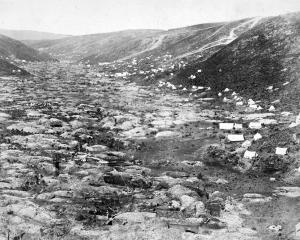The 2016 Rio Olympics will be a bit peculiar. But they have nothing on the farcical 1900 Paris Olympics, at which New Zealand did, or maybe did not, win its first gold medal, writes Bruce Munro.
It should be simple. Victor Lindberg, who spent most of his life farming south of Auckland, competed in water polo at the 1900 Paris Olympics. His team won their event. So, he is New Zealand's first Olympian, and a gold medal winner, to boot.
That, however, is neither the end nor the beginning of the story, thanks in large part to the stranger-than-fiction French Olympic Games in which Lindberg competed.
This week's 31st Olympiad, in Rio de Janeiro, Brazil, is shaping up to be a slightly chaotic affair.
The country is in the grip of a deep economic recession, not to mention a protracted political crisis.
Increasing crime in ''the magnificent city'' was highlighted this week when New Zealand jiu-jitsu athlete Jason Lee was kidnapped and robbed by men in police uniforms.
Last month, elsewhere in Rio, body parts of unknown origin washed up near the beach volleyball venue.
Less grisly forms of water pollution are still an issue at sailing, rowing and triathlon venues.
Then there are the missing athletes.
The often-dominant Russian sportsmen and women will only be let in on a case-by-case basis in the wake of revelations of widespread state-sponsored doping.
And a handful of other top sportspeople, particularly male golfers, are not competing, ostensibly because of fears about the zika virus.
Officials, however, are saying all the crucial components will be in place in time for the August 5 opening ceremony.
Even if that proves untrue, the citizens of Rio can take some small solace from the thought that nothing comes close to the shambles that was the Paris Olympics held 116 years ago.
Victor Lindberg was 25 years old when he competed in Paris, in August, 1900.
Born Michael Victor Alexander Lindberg, in Fiji, to Swedish and Irish parents, he moved to New Zealand with his family as a child.
During the 1890s, Lindberg was winning praise at swimming championships throughout the North Island. He then shifted to Australia, before sailing with three fellow Bondi swimming club members to compete in events in Europe.
There was a two-year stint back in New Zealand, then the gallivanting swimmer headed back to the United Kingdom in early 1900.
He was soon selected by the Royal Life Saving Society for the Osborne Swimming Club's four-man water polo team to compete at the Olympic Games, in Paris.
At that time, it was common for sporting organisations to compete on behalf of their nation.
The Osborne water polo team thrashed its opponents, winning 12-0 and 10-1 on its way to the August 13 final against the Brussels Swimming and Water Polo Club.
It is recorded that the Osborne team actually held back in the final, so as not to humiliate the Belgians, but still won 7-2.
Despite this emphatic win, it would be more than a century before Lindberg was honoured as not only a gold medal-winning Olympian, but New Zealand's first Olympic Games competitor. Probably.
The all-important qualifier has a fair bit to do with the Games themselves.
The Paris Games were only the second of the modern era. There were a lot of wrinkles to iron out.
That became a Herculean task when, according to Encyclopaedia Britannica, Pierre de Coubertin, founder of the modern Olympics and president of the International Olympic Committee (IOC) ''lost control of his hometown Games to the French government''.
The 1900 Olympics became the stuff of legend, for all the wrong reasons.
The track and field events were held on a lumpy grass field that was often wet. Hurdles were made of broken telephone poles. The hammer throw venue was dotted with trees.
Swimming races took place not in a pool but in the River Seine. Swimmers had to dodge watercraft but were helped to surprisingly fast times by the river's strong current.
The Games were made a sideshow of the World Exhibition held in the French capital that summer.
Instead of being a focused fortnight of sporting endeavour, the event was spread out over five and a-half months, giving it the ignominious distinction of the longest-ever Olympic Games.
The height and breadth of the Games were equal to their interminable length.
Almost 59,000 athletes participated - compared with about 10,000 competing at Rio - setting another unbeatable record.
But, because of the length of the event and its general lack of organisation, a fair number of people competed without ever realising they were part of the Olympics.
There were so many competitors partly because there were so many sports, 34 in all.
Despite not having official IOC approval, women competed in three of them - tennis, golf and sailing - marking it as the first Olympics to include women athletes.
But that detail is often not heard above the raucous laughter engendered by listing some of the events that were included in the Olympics that year.
There was cannon-shooting, pigeon-shooting (yes, live, not clay) and kite-flying. Olympic kite-flying.
There was underwater swimming, hot-air ballooning, water motorsports and longue paume (six-a-side tennis).
But wait, there is more.
The volunteer firefighting competition was won by Portugal, while Kansas City, United States took out the professional title.
The fate of the US tug-o-war team is less clear. By some accounts it was disqualified, while others say it never competed. The tug-o-war final was a triumph for a combined Swedish and Danish team over the French.
Rugby got its first run at the Olympics in 1900. There was a French team, a Frankfurt team representing Germany and the Moseley Wanderers taking the field for Great Britain.
British newspaper reports of the Wanderers' 27-8 loss to France do not mention the Games, making it doubtful the players knew they were Olympians.
The French also beat the Germans 27-17, giving them the gold medal.
After Lindberg's win at Paris, he returned to New Zealand, married, bought a farm and raised a family at Pukekawa, south of Auckland.
There are no reports of any more swimming wins but he played rugby and tennis in the area before retiring to Greenlane, Auckland, in the late1940s. He died in 1951, aged 75.
His granddaughter, Gwenyth Cossey (75), of Kaitaia, says she knew her grandfather was a competitive swimmer but had no clue about his Olympic exploits until two years ago.
Nor, it seems, did virtually anyone else. Why? Lindberg's name was misspelt in some official records.
In others, it was omitted in favour of a swimmer who died a year before the Paris Olympics.
There were also some reports from the period labelling Lindberg as an Australian.
But in 2013, British swimming historian and archivist Wendy Coles declared her research showed a Victor Lindberg should be on the list of the winning Osborne club water polo team that competed in Paris.
This is corroborated by reports in The Times, of London, and The Auckland Star.
Ron Palenski, however, does not believe that revelation automatically means Lindberg is New Zealand's first Olympic gold medal winner. And that is not just because medals were not given out until the 1904 St Louis, US, games.
Mr Palenski is an historian and chief executive of the New Zealand Sports Hall of Fame, in Dunedin.
The Hall of Fame has a display dedicated to Lindberg.
Mr Palenski's doubts centre on whether or not Lindberg was a New Zealander.
''I'm not convinced,'' he says.
Lindberg certainly became a New Zealander in later life. But, Mr Palenski asks, was he when he competed in Paris?
''National identity and rules ... were different then. It really comes down to: did he think he was a New Zealander? Did he feel like a New Zealander?''
If Lindberg is discounted, then there are a couple of other contenders for the title of first medal-winning New Zealand Olympian.
An ''Australasian'' team took part in the 1908 Olympics, in London.
Harry Kerr, one of three competitors from New Zealand, took the bronze medal in the 3500m walking race.
Four years later, New Zealander Malcolm Champion won a gold medal as a member of the Australasian swimming relay team competing in Stockholm, Sweden.
Those who prefer to live without any doubt, however, have to wait a few more years.
New Zealanders first competed in the Olympic Games in their own right in 1920, in Antwerp, Belgium.
Eight years later, in Amsterdam, Netherlands, welterweight boxer Ted Morgan became the first Kiwi competing under the New Zealand flag to win a gold medal.
The New Zealand Olympic Committee has no such qualms. Within months of Ms Coles' announcement Lindberg had indeed competed, and emerged victorious, from the chaos of the 1900 Paris Olympics, the committee claimed him as our own.
In mid-2014, Olympic Committee members, sportspeople and Lindberg's descendants, including Mrs Cossey, were gathered to put the official stamp on his new status.
Descendants were presented with centennial Olympic pins. They were also given copies of a certificate declaring to the whole world Lindberg's achievements and his prime place in New Zealand Olympic history.
''This is to certify that Michael Victor Lindberg, in having attended the Olympic Games, of Paris, 1900, competing for Great Britain in the sport of water polo, was the first New Zealander to compete at an Olympic Games, to be a medallist at an Olympic Games and to win a gold medal at an Olympic Games.''












